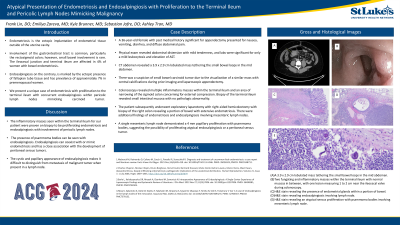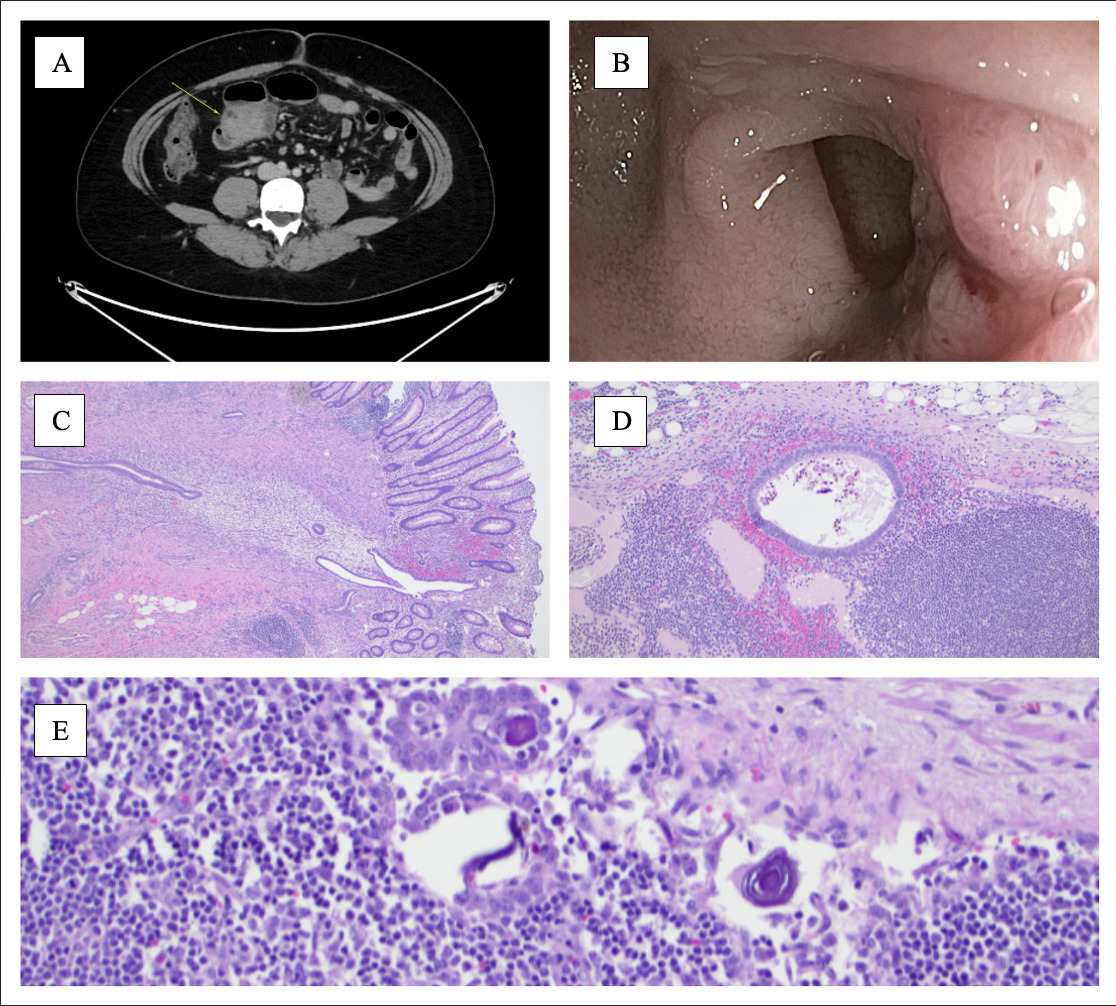Monday Poster Session
Category: Small Intestine
P3248 - Atypical Presentation of Endometriosis and Endosalpingiosis With Proliferation to the Terminal Ileum and Pericolic Lymph Nodes Mimicking Malignancy
Monday, October 28, 2024
10:30 AM - 4:00 PM ET
Location: Exhibit Hall E

Has Audio

Frank Lin, DO
St. Luke's University Health Network
Allentown, PA
Presenting Author(s)
Frank Lin, DO1, Emiliya Zareva, MD2, Kyle Brunner, MD2, Sebastian Jofre, DO3, Ashley Tran, MD3
1St. Luke's University Health Network, Allentown, PA; 2St. Luke's University Health Network, Easton, PA; 3St. Luke's University Health Network, Bethlehem, PA
Introduction: Endometriosis is the ectopic implantation of endometrial tissue outside of the uterine cavity. Involvement of the gastrointestinal tract is common, particularly the rectosigmoid colon; however, small bowel involvement is rare. The ileocecal junction and terminal ileum are affected in 4% of women with bowel endometriosis. Endosalpingiosis on the contrary, is marked by the ectopic presence of fallopian tube tissue and has prevalence of approximately 7% in premenopausal women. We present a unique case of endometriosis with proliferation to the terminal ileum with concurrent endosalpingiosis within pericolic lymph nodes mimicking carcinoid tumor.
Case Description/Methods: A 36-year-old female with past medical history significant for appendectomy presented for nausea, vomiting, diarrhea, and diffuse abdominal pain. Physical exam revealed abdominal distension with mild tenderness, and labs were significant for only a mild leukocytosis and elevation of AST. CT abdomen revealed a 3.9 x 2.9 cm lobulated mass tethering the small bowel loops in the mid abdomen. There was a suspicion of small bowel carcinoid tumor due to the visualization of a similar mass with central calcifications during prior imaging and laparoscopic appendectomy. Colonoscopy revealed multiple inflammatory masses within the terminal ileum and an area of narrowing of the sigmoid colon concerning for external compression. Biopsy of the terminal ileum revealed small intestinal mucosa with no pathologic abnormality. The patient subsequently underwent exploratory laparotomy with right-sided hemicolectomy with biopsy of the right colon revealing a portion of bowel with extensive endometriosis. There were additional findings of endometriosis and endosalpingiosis involving mesenteric lymph nodes. A single mesenteric lymph node demonstrated a 4 mm papillary proliferation with psammoma bodies, suggesting the possibility of proliferating atypical endosalpingiosis or a peritoneal serous tumor.
Discussion: The inflammatory masses seen within the terminal ileum for our patient were proven on biopsy to be proliferating endometriosis and endosalpingiosis with involvement of pericolic lymph nodes. The presence of psammoma bodies can be seen with endosalpingiosis. Endosalpingiosis can coexist with or mimic endometriosis and has a close association with the development of peritoneal serous tumors. The cystic and papillary appearance of endosalpingiosis makes it difficult to distinguish from metastasis of malignant tumor when present in a lymph node.

Disclosures:
Frank Lin, DO1, Emiliya Zareva, MD2, Kyle Brunner, MD2, Sebastian Jofre, DO3, Ashley Tran, MD3. P3248 - Atypical Presentation of Endometriosis and Endosalpingiosis With Proliferation to the Terminal Ileum and Pericolic Lymph Nodes Mimicking Malignancy, ACG 2024 Annual Scientific Meeting Abstracts. Philadelphia, PA: American College of Gastroenterology.
1St. Luke's University Health Network, Allentown, PA; 2St. Luke's University Health Network, Easton, PA; 3St. Luke's University Health Network, Bethlehem, PA
Introduction: Endometriosis is the ectopic implantation of endometrial tissue outside of the uterine cavity. Involvement of the gastrointestinal tract is common, particularly the rectosigmoid colon; however, small bowel involvement is rare. The ileocecal junction and terminal ileum are affected in 4% of women with bowel endometriosis. Endosalpingiosis on the contrary, is marked by the ectopic presence of fallopian tube tissue and has prevalence of approximately 7% in premenopausal women. We present a unique case of endometriosis with proliferation to the terminal ileum with concurrent endosalpingiosis within pericolic lymph nodes mimicking carcinoid tumor.
Case Description/Methods: A 36-year-old female with past medical history significant for appendectomy presented for nausea, vomiting, diarrhea, and diffuse abdominal pain. Physical exam revealed abdominal distension with mild tenderness, and labs were significant for only a mild leukocytosis and elevation of AST. CT abdomen revealed a 3.9 x 2.9 cm lobulated mass tethering the small bowel loops in the mid abdomen. There was a suspicion of small bowel carcinoid tumor due to the visualization of a similar mass with central calcifications during prior imaging and laparoscopic appendectomy. Colonoscopy revealed multiple inflammatory masses within the terminal ileum and an area of narrowing of the sigmoid colon concerning for external compression. Biopsy of the terminal ileum revealed small intestinal mucosa with no pathologic abnormality. The patient subsequently underwent exploratory laparotomy with right-sided hemicolectomy with biopsy of the right colon revealing a portion of bowel with extensive endometriosis. There were additional findings of endometriosis and endosalpingiosis involving mesenteric lymph nodes. A single mesenteric lymph node demonstrated a 4 mm papillary proliferation with psammoma bodies, suggesting the possibility of proliferating atypical endosalpingiosis or a peritoneal serous tumor.
Discussion: The inflammatory masses seen within the terminal ileum for our patient were proven on biopsy to be proliferating endometriosis and endosalpingiosis with involvement of pericolic lymph nodes. The presence of psammoma bodies can be seen with endosalpingiosis. Endosalpingiosis can coexist with or mimic endometriosis and has a close association with the development of peritoneal serous tumors. The cystic and papillary appearance of endosalpingiosis makes it difficult to distinguish from metastasis of malignant tumor when present in a lymph node.

Figure: (A) A 3.9 x 2.9 cm lobulated mass tethering the small bowel loops in the mid abdomen. (B) Two fungating and inflammatory masses within the terminal ileum with normal mucosa in between, with one lesion measuring 1 to 2 cm near the ileocecal valve during colonoscopy. (C) H&E stain revealing the presence of endometrial glands within a portion of bowel. (D) H&E stain revealing endosalpingiosis involving lymph node. (E) H&E stain revealing an atypical serous proliferation with psammoma bodies involving mesenteric lymph node.
Disclosures:
Frank Lin indicated no relevant financial relationships.
Emiliya Zareva indicated no relevant financial relationships.
Kyle Brunner indicated no relevant financial relationships.
Sebastian Jofre indicated no relevant financial relationships.
Ashley Tran indicated no relevant financial relationships.
Frank Lin, DO1, Emiliya Zareva, MD2, Kyle Brunner, MD2, Sebastian Jofre, DO3, Ashley Tran, MD3. P3248 - Atypical Presentation of Endometriosis and Endosalpingiosis With Proliferation to the Terminal Ileum and Pericolic Lymph Nodes Mimicking Malignancy, ACG 2024 Annual Scientific Meeting Abstracts. Philadelphia, PA: American College of Gastroenterology.
